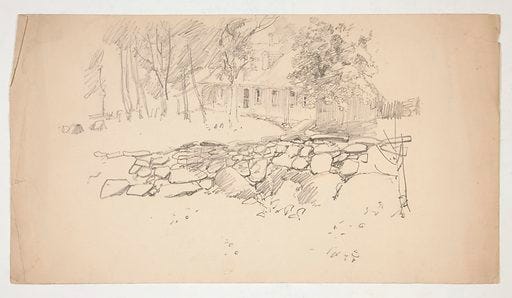“Something there is that doesn’t love a wall,” says Robert Frost in the first line of our Poem of the Week, “that wants it down.” I agree, and I wonder why. When I was a boy, we took for granted as an unwritten law of childhood that it was all right to cross through people’s backyards, so long as you didn’t go too near the house and you didn’t do any harm. That meant that we criss-crossed over the neighborhoods with great expedition, with short cuts everywhere, and of course if the yard belonged to your aunt and uncle and cousins, you could go right into the house if the door was open, to say hello and get a cold drink or use the bathroom. The walls, so to speak, were permeable. In those days, too, the church was open all day long, so you could just walk in and say a prayer if you wanted to. This kind of tacit permission to comb the land, including the woods, the river, the defunct trestle, the old mine roads, the reservoir, heaps of coal like mountains in the mountains, and everything else you might come upon, was a holdover from the days when everybody knew everybody else, cousins of cousins or grandparents of people across the street, so you could trust even people you didn’t like. Walls? What were they?
So when I first read the poem, back in high school, my sympathy was all with the speaker and not with his neighbor, and maybe that’s where our sympathy ought to lean, though I’m not so sure of that anymore. Yes, the neighbor is like “an old stone savage armed,” gripping a stone in each hand from the top, and not much for words, and even less for imagination. All he says is what his father said before him, as if it were unchangeable wisdom outlasting the ages: “Good fences make good neighbors.” But is that true? If it is, why is it? Isn’t it only true if there’s a kind of enmity between you and your neighbor, or a real harm that the wall is to guard against? Why do they have to mend the wall, when it’s all pine on the neighbor’s side and apple orchard on the speaker’s side? What’s the point of the wall?
Chesterton famously said that you should never take down a fence if you don’t know why it’s there. That’s the great man running athwart the restlessness of modern reformers. They say that they’ll take down the fence because they see no reason for it. “We don’t see why men should ever have adopted the custom of standing up when a woman entered the room.” Fine, you don’t see it. When you do see it, then and only then can you argue that the custom’s out of date. Actually, I don’t think it is, but that’s another matter. Frost adopted that same kind of wisdom when it came to self-imposed restrictions in poetry. “We don’t see why English poetry should be written in meter.” Fine, you don’t see it. When you do see it, and I think Walt Whitman did see it, then you can make an argument for doing without it. Frost himself said that taking the metrical wall down was like getting rid of the net in tennis — no fun. The net, the lines, and the rules define the game, and make the art of tennis possible. Perhaps — I’m not going to decide the issue — walls or some things that are like walls make neighbors possible.
It doesn’t seem, in this poem, that the man who likes mending the wall, which isn’t going to stay intact anyhow, is a real neighbor to the speaker. They don’t talk. They are friendly in the most restrained and reserved way. Maybe “elves” make the gaps in the wall and not mischievous and thoughtless hunters chasing their quarry. Maybe we ought to take the lead of those mysterious creatures — of the “something” that doesn’t love a wall. But maybe if you have a wall you have a definition, a form, a place that is yours in a special way. And that reminds me of another custom we had when I was a boy.
A half mile behind our dead-end street, perched in the woods atop a steep embankment of coal overlooking the town, my cousins and I found what we called a “foundation,” three and a half stone walls several feet high and about eight feet square. Of course that meant we had to drag some planks up there to make a “roof,” with a hole in it and an aluminum pipe for a “chimney,” and we planned to cook hot dogs in a fire we’d light underneath. But still another custom had it that if you found somebody else’s “fort” in the woods, you were supposed to have it down, to wreck it, and that in fact is what happened. It sort of makes the “old stone savage” look wise and even civilized. What do you think?
Something there is that doesn’t love a wall, That sends the frozen-ground-swell under it, And spills the upper boulders in the sun; And makes gaps even two can pass abreast. The work of hunters is another thing: I have come after them and made repair Where they have left not one stone on a stone, But they would have the rabbit out of hiding, To please the yelping dogs. The gaps I mean, No one has seen them made or heard them made, But at spring mending-time we find them there. I let my neighbor know beyond the hill; And on a day we meet to walk the line And set the wall between us once again. We keep the wall between us as we go. To each the boulders that have fallen to each. And some are loaves and some so nearly balls We have to use a spell to make them balance: ‘Stay where you are until our backs are turned!’ We wear our fingers rough with handling them. Oh, just another kind of out-door game, One on a side. It comes to little more: There where it is we do not need the wall: He is all pine and I am apple orchard. My apple trees will never get across And eat the cones under his pines, I tell him. He only says, ‘Good fences make good neighbors.’ Spring is the mischief in me, and I wonder If I could put a notion in his head: ‘Why do they make good neighbors? Isn’t it Where there are cows? But here there are no cows. Before I built a wall I’d ask to know What I was walling in or walling out, And to whom I was like to give offense. Something there is that doesn't love a wall, That wants it down.’ I could say ‘Elves’ to him, But it’s not elves exactly, and I’d rather He said it for himself. I see him there Bringing a stone grasped firmly by the top In each hand, like an old-stone savage armed. He moves in darkness as it seems to me, Not of woods only and the shade of trees. He will not go behind his father’s saying, And he likes having thought of it so well He says again, ‘Good fences make good neighbors.’
Listen to this episode with a 7-day free trial
Subscribe to Word & Song by Anthony Esolen to listen to this post and get 7 days of free access to the full post archives.













